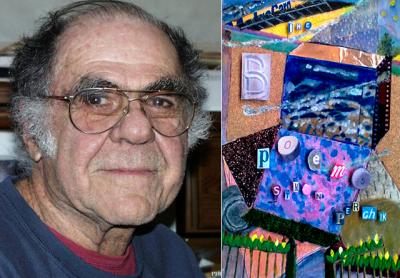Doors to Discovery

“The B Poems”
Simon Perchik
Poets Wear Prada, $15
Simon Perchik explores the underworld in these deeply rich, elemental verses to or about B. Who or what B might be, we may not know. However, it fits the subject of the book not to know.
Readers familiar with Mr. Perchik’s poetry will already have a sense of the density of his writing. The word “unpack” does not do justice to what must happen for the poems to be understood. Mr. Perchik challenges the very notion of understanding to arrive at something more rewarding and profound.
Slowly you have forgotten how
and after each rain reach out
as if this folding ladder
once skimmed the rooftops
was taught to trust the sky
though rung by rung
you no longer lead the dead
to the dead trapped above you
and what passes for rescue
never leaves the ground
or backs away, shaky, not sure
what headwinds do or don’t
— you have forgotten how to fly . . .
(From the poem B40.)
So much of contemporary language is empty, catchy yet without the full body of something potent behind it. What is being said may be thoughtful, yet its meaning has a shelf life as we face the barrage of message upon message to follow. So much of what is said causes us to flinch, either from knowing the predictable nature of a statement doomed to expire, or from the fatigue of receiving boring lies. The B poems are not only different from how we speak or listen to others speak, but different from other published literature.
It is important to note that Mr. Perchik turned 93 on Christmas Eve and has published more than 20 books of poetry in the last 50 years. (He got a late start.)
It is equally important to note that the B poems lack all artifice. What may be read as abstraction or an aesthetic technique simply is not. These are raw, visceral, truthful accounts of the world. Page after page is gripping, to the death, of the very essentials that make up life. There is nothing superfluous, unnecessary, or extemporaneous. These are the poems of a master craftsman at his unadorned best, literal gifts to humanity, real doors to discovery.
You can still make out the stars
though it’s noon and the beach
changes — you can tell by the feel
and listening for engine scrap
breaking apart, smelling from smoke
expects you to stand up barefoot
keep struggling with shoreline
— you’re not new to this
will start the grill weeks ahead . . .
(From the poem B59.)
The poems in the collection are numbered from B1 to B63 in ascending order. Whether or not the numerology is significant is insignificant. Every poem is written in unrhymed tercets, three-line stanzas that build a rhythm from poem to poem. Yet again, the power of these poems is not in their formal presence, but in their very naked and awkward insistence to begin again. Forget about understanding the bigger picture and just feel how the words make you feel. Then reread them.
There is magic in the way we try to wrap our minds around nothing, and Mr. Perchik gets it. He gives time a voice. Flesh becomes dirt. Opposites like rain and stone come to know each other. The ritual rise of daylight becomes a miraculous action again. The fact that anything occurs is cause for wonder.
These are heartbreakingly beautiful poems about the nature of our suffering. They show us how we are not alone, how things like clouds and mountains are our natural companions. They evoke memories and fantasies and pure love for another person.
You begin the way shorelines
risk their life this close
though after each funeral
you drown in the row by row
where each photograph is overturned
shaken loose from the family album
— her shoes seem pleased
to be shoes, not walk anymore
or store their darkness for later . . .
standing next to her, eye to eye
without saying a word, would leave
if you knew how to turn away
the blank page, solid black
not a beach, not a breath, nothing
that understands this emptiness.
(From the poem B38.)
I want to quote a hundred more lines from “The B Poems” for you. It feels as if a thousand pens were dancing all at once. Upon first reading, it seemed the book was all about darkness and death. After rereading, it seems to be all about life and light. I’m sure Mr. Perchik, incredible poet and national treasure, knows it’s about both.
Lucas Hunt is the author of the poetry collections “Lives,” “Light on the Concrete,” and “Iowa,” which is forthcoming. Formerly of Springs, he is the director of Orchard Literary and the founder of Hunt & Light, a publisher of poetry.
Simon Perchik lives in Springs.
